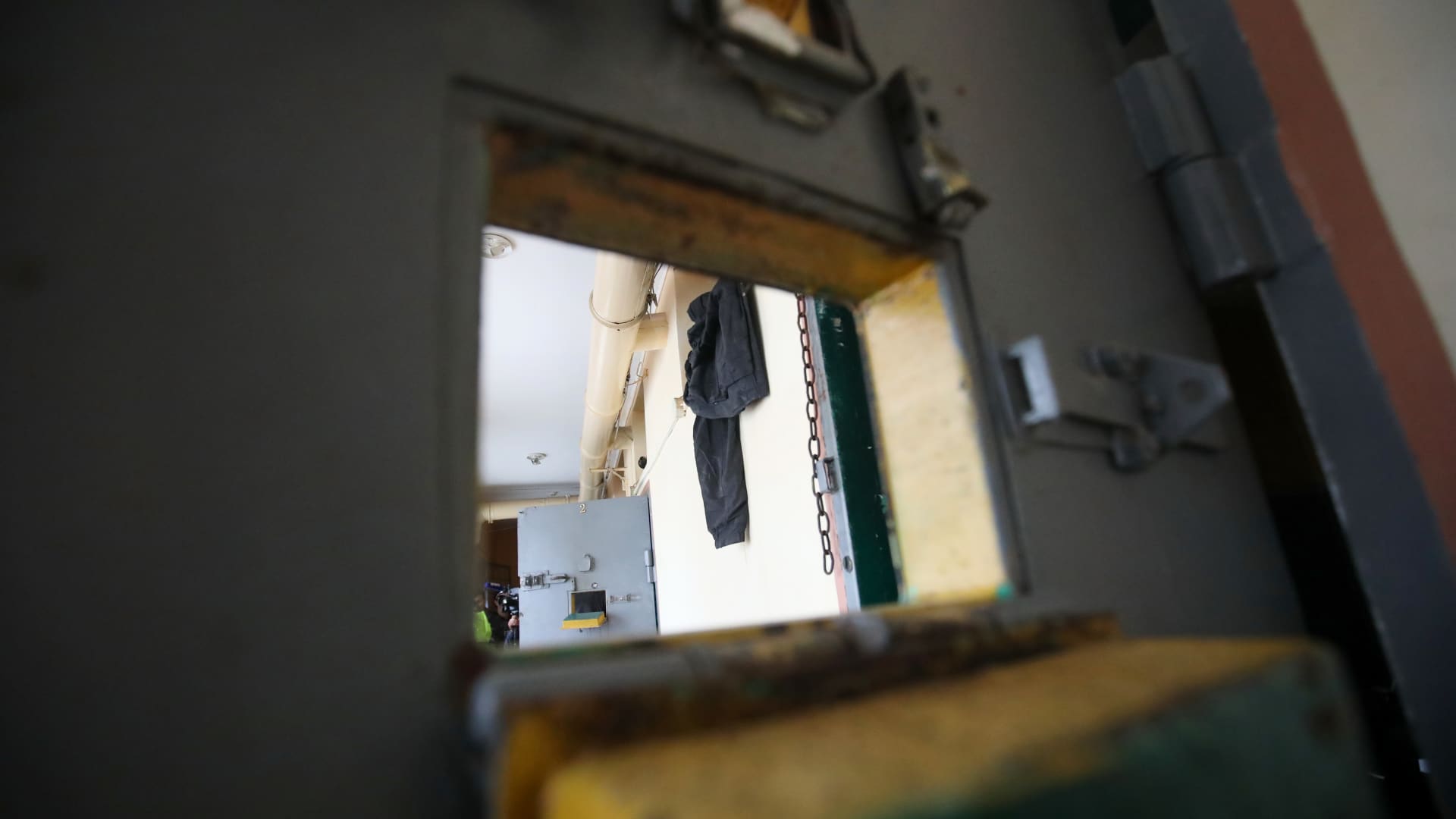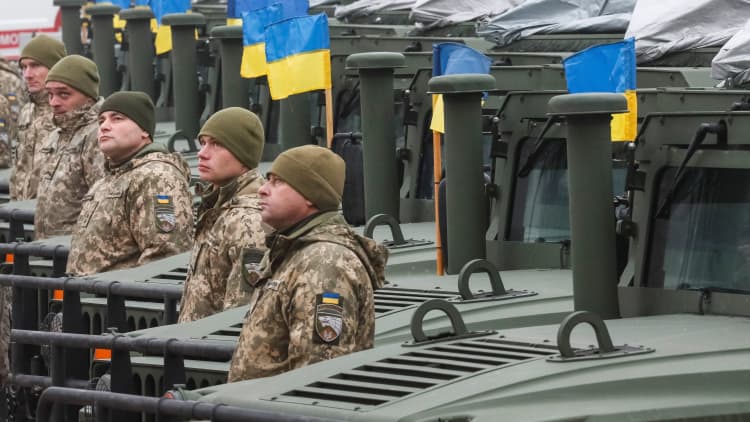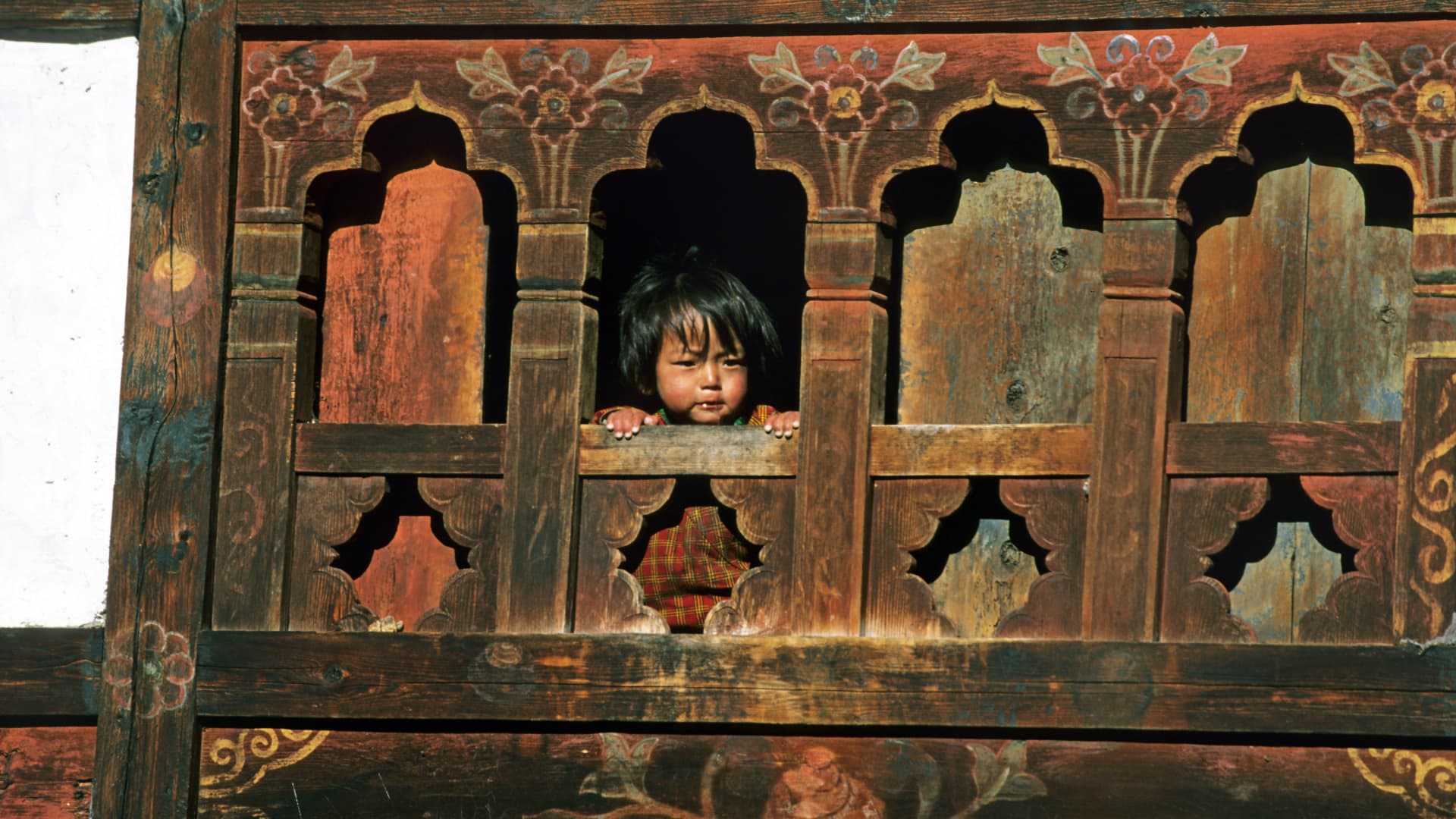UN report details horrifying Ukrainian accounts of abuse and torture in Russian prisons
In some cases, the investigators found that Ukrainian forces tortured Russian troops, though those incidents were less frequent.

Editor's note: The following article contains graphic material detailing reports of torture and sexual violence.
The window in the door frames the corridor at the District Police Department used by Russian occupiers for torture, Balakliia, Kharkiv Region, northeastern Ukraine.
Vyacheslav Madiyevskyy | Ukrinform | Future Publishing | Getty Images
WASHINGTON — A report commissioned by the United Nations found that Russian forces have committed widespread abuse against prisoners captured during the invasion of Ukraine.
The report by the Office of the High Commissioner for Human Rights found that both Russia and Ukraine have captured a high number of prisoners of war. In some cases, the investigators found that Ukrainian forces tortured Russian troops, though those incidents were less frequent.
In preparing the report, investigators conducted 159 interviews over the course of eight months. The report follows a separate U.N. account of widespread human rights abuses by Russia during the war.
Investigators said that before Ukrainian service members were transferred to a makeshift Russian detention facility or penal colony, they were stripped of their belongings, including money, credit cards, jewelry, military clothes and boots.
The report said prisoners of war, or POWs, were then sent to places of internment in inhumane ways:
They were often transported in overcrowded trucks or buses and sometimes lacked access to water or toilets for more than a day.
Their hands were tied and eyes covered so tightly with duct tape that wounds were left on their wrists and faces that continued to bleed for up to several days.
Some former Ukrainian POWs recounted sporadic incidents where Russian soldiers who had captured, transported or guarded Ukrainian POWs beat them in apparent retribution for military setbacks or in the immediate aftermath of battle.
The conditions of the Russian detention facilities were described as overcrowded and dirty with insufficient lighting and heat, according to investigators.
Prisoners said they were denied access to natural light or fresh air, and were kept in a single cell with up to 30 other people. They also described a lack of beds, toilets, showers and hygiene items such as toothbrushes and toothpaste, the report said.
Female prisoners told investigators they were subjected to invasive examinations during admission procedures in the presence of male guards. The women prisoners also said they were forced to undress and walk naked down hallways. Some women said they were ordered to undress, bend over and touch their feet while guards beat their backs with batons, according to the report.
The women prisoners who were interviewed said that while they were not physically tortured, they were placed in cells close to where male prisoners were being beaten and tortured.
"They were constantly psychologically tormented by the screams of male POWs being tortured or ill-treated. Such episodes lasted up to hours and took place at all times of the day and night," the report said.
One woman told U.N. investigators, "I still cannot stand the sound of duct tape. Guards used it to immobilize their victims and start torturing them."
Kherson, UkraineNov. 16, 2022A Ukrainian police officer stands inside a detention center used by the Russian forces for interrogations, detentions, and torture according to the Ukrainian authorities on Nov. 16, 2022.
Carolyn Cole | Los Angeles Times | Getty Images
Ukrainian prisoners described so-called "admission procedures" upon arrival at the place of internment, which involved prolonged beatings, strangling, twisting or breaking of joints or bones, attacks by dog, tasering, mock executions, sexual violence, stripping and use of stress positions. The prisoners also said they were forced to sing Russian children's songs and were beaten if they refused or made mistakes, according to U.N. investigators.
The report found that the most widespread form of torture was "beatings by hand, batons or wooden hammers and kicks to various parts of the body, but usually avoiding the head and other vital areas."
One prisoner told investigators he was captured and detained in a Russian penal colony near the eastern Ukrainian city of Donetsk. He said that during one interrogation session, Russians "attached wires to my genitalia and nose and shocked me."
"They simply had fun and were not interested in my replies to their questions," he told U.N. investigators.
The report added that other prisoners described similar forms of sexual violence such as "pulling a victim by a rope tied around his genitalia."
Russian guards also inserted burning cigarettes in a victim's nostrils, hung prisoners by hands or legs for extended periods of time and applied tourniquet-like devices to painfully constrict blood circulation to limbs, according to the report.
Investigators from the Office of the High Commissioner for Human Rights said prisoners described methods in which "food became an instrument of humiliation:"
Several POWs released from various places of detention described being forced to consume their food in a harmful or humiliating manner. In some cases, POWs had only 45 seconds to 2 minutes to eat, including very hot food that would burn their mouths and throats.
Others said they had to eat from dirty dishes or dishes with detergent residue, which caused them digestive problems.
Investigators said more than 80% of the former Ukrainian prisoners of war interviewed complained about the insufficient amount or poor quality of food.
"They said they were given, for example, undercooked bread, meals with rotten ingredients, or porridge or spaghetti with sand or small rocks in it," according to the report.
Investigators found that some prisoners lost up to a quarter of their body weight as a result of the lack of food, poor hygiene and sickness. In most cases, Ukrainian prisoners were released without having received adequate medical care.
"Some identified hunger as the most severe hardship suffered while in captivity," the authors of the report wrote.


 Tekef
Tekef 






























